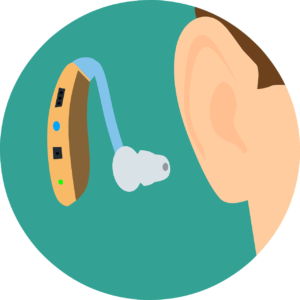WASHINGTON, DC – October 17, 2022 – On October 17th, a final rule was issued by The Food and Drug Administration (FDA) that establishes the category of over-the-counter (OTC) hearing aids for adults with mile-to-moderate hearing loss. They can be bought at a store or online without a doctor’s prescription, exam or fitting by an audiologist. The rule will apply to “air conduction” hearing aids that are to be worn behind or inside the ear. The FDA estimates that this measure will save Americans up to $3000 per pair. This is a result of an executive order by President Biden to the FDA in July.
There are almost 30 million Americans with significant hearing loss. However, hearing aids are only used by about 1 in 5 people with hearing loss. A person with mild hearing loss can hear some speech but may have difficulty hearing soft sounds. A person with moderate hearing loss may not be able to hear a person who speaks at a normal level.
Hearing loss is more common in older persons. It has been estimated that almost 25% of people ages 65 to 74 and 50% of people ages 75 and older have significant hearing loss. Traditional Medicare does not pay for the hearing aids so many people aged 65 and up cannot afford to buy them. It is felt that by lowering the price of a pair of hearing aids, that more people will be able to get them. They will be able to communicate better. This leads to a healthier person.
Large retailers across the country have begun to sell OTC hearing aids including Walgreens, CVS, Walmart, Best Buy and Hy-Vee. The prices of an OTC hearing aid will run between $199 and $3000 a pair. However, prescription hearing aids are more expensive costing from $2000 to $8000 a pair.
Kate Carr, president of the Hearing Industries Association, a group that includes hearing aid manufacturers, suppliers, distributors and auditory health professionals, recommends that people get a hearing test before making a hearing aid purchase. Tests by hearing professionals are considered very accurate. However, a cheaper alternative is an online hearing test, but these may not be as accurate depending on the sound quality of the device that is used to take the test.
Listen to the full report below:
Contact: Dr. Dick Needleman, Health reporter, 103.3 AshevilleFM, [email protected]
More Posts for Show: Asheville FM News Hour
